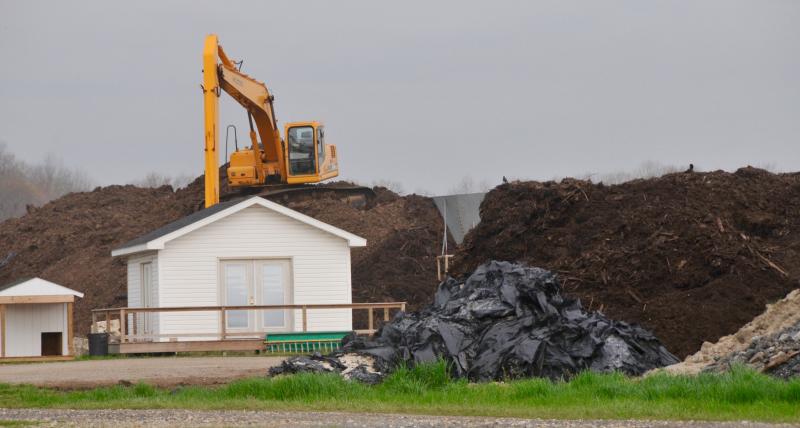Blessing Compost reveals plans to upgrade facility
After receiving requested information from state environmental officials, Sussex County Planning and Zoning Commission voted April 6 to close the public record on a conditional-use application filed by Blessing Greenhouses and Compost.
The commission had voted March 23 to leave the public record open. Commissioner Marty Ross, who was acting chairman, said the commission wanted information from the Department of Natural Resources and Environmental Control on the status of the consent agreement they have with owner Bruce Blessing. They also wanted additional information on a gravel stormwater management system proposed for the site.
“One of the conditions will be compliance with all DNREC permits, and at this point we are not clear where they stand right now,” said assistant county attorney Vince Robertson.
“As they look at it right now, are they in compliance with the consent order or not?” he asked.
“They are asking for a path forward to make it right, but we are also concerned about what needs to happen before they can even make it right.”
Owner Bruce Blessing says he has complied with the consent order since it was imposed in 2014.
Blessing is seeking a conditional-use to operate his business on a 31-acre agricultural-residential, AR-1, zoned parcel at 9372 Draper Road, Milford, for composting, mixing, blending and bagging, including poultry by-products and trucking and wholesale distribution.
The owner plans to upgrade the operation to a state-of-the-art facility, said attorney Tim Willard.
Blessing Blends organic compost is the major product produced at the site and is sold retail and wholesale. Flowers and vegetables are grown in greenhouses at the site.
Willard said Blessing had one violation in 2010 that dealt with transfer of material at the site. In addition, he said, composting is an agriculture-related industry that is permitted on AR-1 zoned land.
Blessing uses yard waste from landscapers and residents and mixes it with poultry by-products to make compost. When asked by Commissioner Kim Hoey Stevenson to explain what poultry byproducts are, Blessing said they could be egg shells, manure or feed additives, which are all approved by DNREC.
The commission did not take action on the application. County council's public hearing is scheduled for 1:30 p.m., Tuesday, April 25, in the county administration building, 2 The Circle, Georgetown. The public record on the application is available in the county's planning and zoning office from 8:30 a.m. to 4:30 p.m. on weekdays.
Plan includes seven new buildings
William Stephens, of Stephens Environmental Consulting Inc., said the plan includes seven new 11,000-square-foot covered buildings with 12-inch concrete floors capable of processing 4,000 cubic yards of compost at a time.
He said the current stormwater management system would be retrofitted to meet DNREC standards and would also include submerged gravel wetlands at areas where nitrogen runoff is an issue. Stephens said years of research show that 98 percent of nitrogen is removed and turned to nitrogen gas with use of the gravel systems, which are not commonly used in Delaware.
Willard said all stormwater is tested and contained on site, and berms are provided along the border with Slaughter Creek.
Bryan Jerose, president of Agri Lab Technologies, said all heat captured in the buildings would be recirculated into the greenhouses. He said concrete floors with drainage systems would reduce runoff and air forced down into the piles would reduce odor. A biofilter would also be built into the system to help alleviate odors.
“This is the most advanced composting recovery system available,” Jerose said.
Williard said the issues raised by residents opposed to the application – including odor – would be addressed by construction of the new facility using new technology. “It would be more environmentally friendly and efficient,” he said.
In addition, he said, Blessing no longer sprays waste material on adjacent farm fields, and that helps alleviate odor issues as well.
Blessing said if the application is approved, he would start construction this summer of two buildings in Phase I.
Residents voice odor, environmental concerns
Several area residents spoke in opposition to the application. They complained about odors that have restricted their outdoor activities for years. They also expressed concerns about runoff into Slaughter Creek, which is adjacent to the property. The creek runs through Prime Hook National Wildlife Refuge to Delaware Bay.
“If approved there should be strict conditions, and the facility should be in place before he's approved,” said nearby resident Jay Stevens. “I'm very suspect this will ever happen. You have to make sure he will do what he says he will do.”
He said the owner has been operating an illegal facility with a record of violations and a history of inaction by environmental officials. “Why hasn't anyone stepped in to do anything?” he asked.
Kathy Phillips, Water Keeper Alliance member, conducted water testing of Slaughter Creek a year ago on behalf of residents. She said she found elevated levels of bacteria, E. coli and fecal coliform. “The Delaware Bay is already impaired. It's irresponsible to add polluted water where it's already impaired,” she said.
Steve Bennett, who lives on Draper Road, said residents have had to deal with offensive odors for at least eight years. “It's worse than sewage; it's made our quality of life down to nothing,” he said. “We complain about it all the time, but he's done nothing to stifle the odors.”
Speaking for residents opposed to the application, environmental consultant Kathy Martin said the commissioners should keep in mind that Blessing has been operating a commercial composting business for 10 years on noncommercial AR-1 land without a conditional-use application.
“This is for future use,” Ross said. “We are not passing judgement if this is good or bad.”
Martin said residents are concerned about their health and the environment. “Blessing has created pollution and has discharged from the site. And he doesn't have all the permits he needs for what we've heard today,” she said.
Martin said the residents want the following conditions in place if the application is approved:
• No more sewer sludge accepted as composting material.
• The proposed upgrades must be completed before additional work begins at the site.
• A flood plain management plan provided and reviewed by the public.
• Storage of new material under roof.
• 24-hour hotline for residents to call.
• No higher than 10-foot-high piles.
• Limit the amount of material at the site.
• Reduce odor by 80 percent.
• No more broken eggs accepted as material for composting.
• No farm field application of stormwater where nitrate levels are more than 8 ppm.


























































